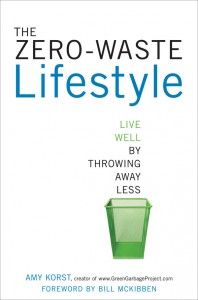Seeking solutions is the route to take in this extremely abused and impaired environment. We have reached a stage where any further degradation to the environment can threaten mankind. Hence the documentary chosen is a good exemplar of rectification to the problem man has created.

Zero-waste[1] may seem like a far-fetched idea to many. How is it possible to live life without producing any waste? Well, let the townspeople of Kamikatsu enlighten you on this. This documentary specifically highlights a small-depopulated rural town in Japan of only 1,700 residences: Kamikatsu (Sakano 2015). 13 years ago in 2003, the government in Kamikatsu along with a few environmentalists pushed for a zero-waste program in the town. 13 years later with discipline and commitment from the townspeople, the zero-waste culture integrated with their everyday lives. Sorting, cleaning, and recycling of their waste is now a social norm in the town; something done so routinely it becomes a conscious-subconscious act. Even as kids, they are trained to take care of the environment by picking up waste in the river and around them, while treating it like a game. This instills a habit into residents to care about rubbish not only within their usage but also around their surroundings. Zero-waste is achieved with the combined efforts of everyone in the community and should be the first step to curing the environment.
How is Kamikatsu able to accomplish this feat? What motivates the townspeople? Will this zero-waste last? Is this exemplar inspirational enough for other towns and states to attempt?
As many have adopted the myth that Japan is really a green nation (Kalland 1997), Kamikatsu might be a good reflection of this statement with their spontaneous citizens ready to gear towards saving the environment. Through the model set by Kamikatsu, the impression is that Japan is a “green nation” with the potential that the rest of Japan will follow suit. However, we can’t jump to the conclusion that the rest of Japan will do so.
Going green brought about positive changes to Kamikatsu town. It has created job opportunities for its ageing population and provided alternative resources such as materials for manufacturing and fertilizers for agriculture. It has even brought about economical change for the once “hopeless town” through the Irodori Project (François, 2007), and Kurukuru shop coupling together with the 34 category recycling (Kiss, 2016). The 3 projects brought about ample economical and social changes to aid in Kamikatsu’s survival (J, 2013). It is quickly becoming a win-win situation for Japan and its environment.
Waste is inevitable. But recycling of materials allows waste to become something of value again, thus limiting the amount of new resources required to make a new product. Nature can be controlled by man’s act, yet man is unable to fully control how nature develops. Hence man can only hope to work towards salvaging nature, while letting nature take its natural course. Perhaps we also need political and ecological conditions that will motivate us to save the environment out of our will.
Bibliography
François, B. (2007). Rethinking Infrastructure for Development. Retrieved September 03, 2016, from https://books.google.com.sg/books?id=S0gIIfP4OGUC
G. (n.d.). What is Zero Waste? GAIA’s definition on Zero Waste World. Retrieved September 03, 2016, from http://zerowasteworld.org/zero-waste-faq/
J.(2013, January 12). Elderly-run ‘leaf business’ in Shikoku town drawing interest from abroad | The Japan Times. Retrieved September 01, 2016, from http://www.japantimes.co.jp/news/2013/01/12/business/elderly-run-leaf-business-in-shikoku-town-drawing-interest-from-abroad/#.V8pwimPg1ew
Kalland, A. (1997). Japanese Perceptions of Nature – Ideals and Illusions
Kiss, D. (2016, May 4). Life in a Zero Waste City – Interview with Akira Sakano – A Better World is possible! Retrieved August 20, 2016, from http://www.betterworldinternational.org/influencers/life-in-a-zero-waste-city-interview-akira-sakano/
Sakano, A. (2015, April 19). Zero waste: A small town’s big challenge. Retrieved from https://www.weforum.org/agenda/2015/04/zero-waste-a-small-towns-big-challenge/
Documentary from: http://video.toggle.sg/en/series/unique-towns/ep5/433345
[1] “Zero waste means setting a new goal for how we live in the world – one that aims to reduce what we trash in landfills and incinerators to zero – and to rebuild our local economies in support of community health, sustainability, and justice” (G, n.d.)

This documentary depicts the vigorous recycling efforts of one community. Recycling is not limited to this village, but according to the filmmakers, the people in Kamikatsu take it particularly seriously. One could easily criticize this documentary as simplistic and excessively celebratory. Where are the opposing voices that likely accompanied the initial adoption of these policies? Where are the voices of people frustrated by those who fail to follow the rules? Where are the voices of individuals on whom the bulk of the labor of recycling falls, such as women and the elderly? Despite the filmmakers’ depiction of these villagers as happily recycling, they are likely not telling the whole story. That said, the community’s efforts are laudable. They are doing something, when it would be easy to do nothing. They are drawing attention from within and outside Japan, and they are possibly inspiring others to make grand efforts, too. The documentary may paint a rosy picture, but it has the potential to inspire profound changes for the better.